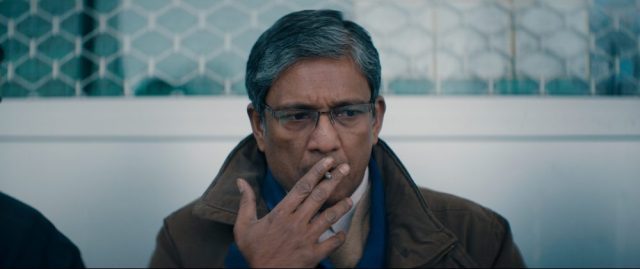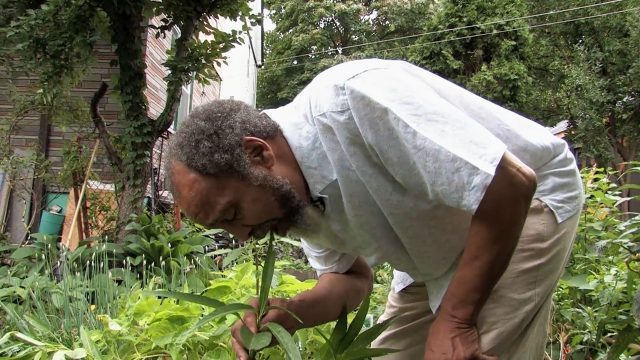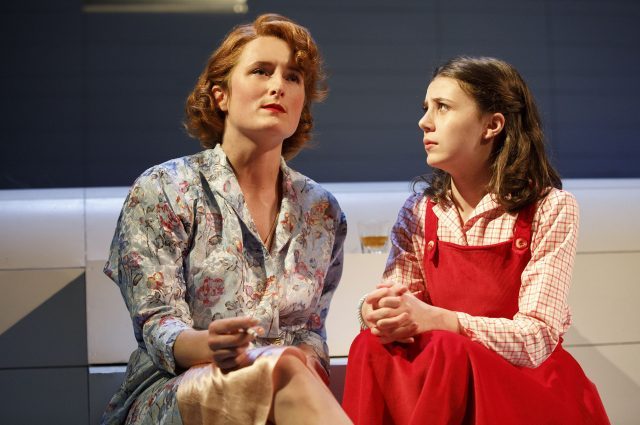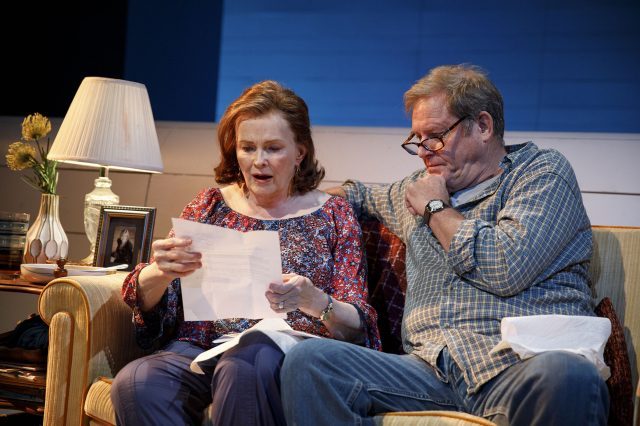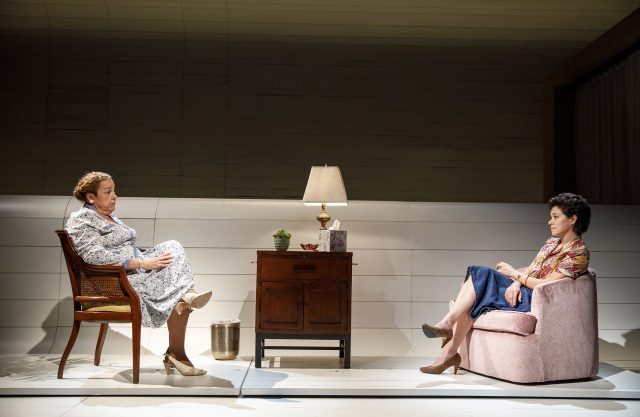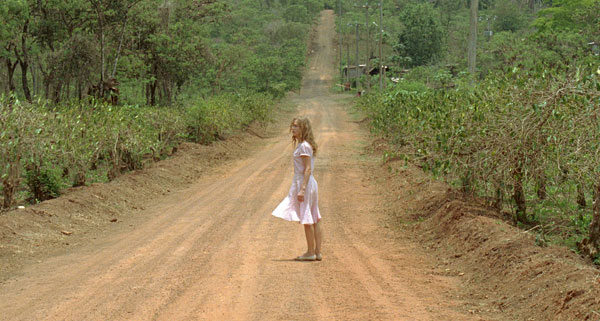
Maria Vial (Isabelle Huppert) is determined to see her coffee crop through to fruition despite the growing dangers in Claire Denis’s White Material
WHITE MATERIAL (Claire Denis, 2009)
BAMcinématek, BAM Rose Cinemas
30 Lafayette Ave. between Ashland Pl. & St. Felix St.
Tuesday, July 17, 7:00
Series continues through July 19
718-636-4100
www.bam.org
www.ifcfilms.com
 BAMcinématek has teamed up with the Racial Imaginary Institute, a collective that “convenes a cultural laboratory in which the racial imaginaries of our time and place are engaged, read, countered, contextualized, and demystified,” to present the series “BAMcinématek and the Racial Imaginary Institute: On Whiteness.” Continuing through July 19, the festival, which “aims to foster a dialogue about what it means to be white in America,” has already shown such films as Taxi Driver, The Swimmer, The Jerk, Rocky, and Ferris Bueller’s Day Off. It moves to another continent on July 17 with Claire Denis’s White Material. In an unnamed West African nation besieged by a bloody civil war between rebels and the military government, Maria Vial (Isabelle Huppert) steadfastly refuses to leave her coffee plantation, determined to see the last crop through to fruition. Despite pleas from the French army, which is vacating the country; her ex-husband, André (Christophe Lambert), who is attempting to sell the plantation out from under her; and her workers, whose lives are in danger, Maria is unwilling to give up her home and way of life, apparently blind to what is going on all around her. She seems to be living in her own world, as if all the outside forces exploding around her do not affect her and her family. Without thinking twice, she even allows the Boxer (Isaach De Bankolé) to stay there, the seriously wounded leader of the rebel militia, not considering what kind of dire jeopardy that could result in. But when her slacker son, Manuel (Nicolas Duvauchelle), freaks out, she is forced to take a harder look at reality, but even then she continues to see only what she wants to see. A selection of both the New York and Venice Film Festivals, White Material is an often obvious yet compelling look at the last remnants of postcolonial European domination as a new Africa is being born in disorder and violence. Directed and cowritten (with French playwright Marie Ndiaye) by Denis (Chocolat, Beau Travail), who was born in Paris and raised in Africa, the film has a central flaw in its premise that viewers will either buy or reject: whether they accept Maria’s blindness to the evolving situation that has everyone else on the run. Watching Maria’s actions can be infuriating, and in the hands of another actress they might not have worked, but Huppert is mesmerizing in the decidedly unglamorous role.
BAMcinématek has teamed up with the Racial Imaginary Institute, a collective that “convenes a cultural laboratory in which the racial imaginaries of our time and place are engaged, read, countered, contextualized, and demystified,” to present the series “BAMcinématek and the Racial Imaginary Institute: On Whiteness.” Continuing through July 19, the festival, which “aims to foster a dialogue about what it means to be white in America,” has already shown such films as Taxi Driver, The Swimmer, The Jerk, Rocky, and Ferris Bueller’s Day Off. It moves to another continent on July 17 with Claire Denis’s White Material. In an unnamed West African nation besieged by a bloody civil war between rebels and the military government, Maria Vial (Isabelle Huppert) steadfastly refuses to leave her coffee plantation, determined to see the last crop through to fruition. Despite pleas from the French army, which is vacating the country; her ex-husband, André (Christophe Lambert), who is attempting to sell the plantation out from under her; and her workers, whose lives are in danger, Maria is unwilling to give up her home and way of life, apparently blind to what is going on all around her. She seems to be living in her own world, as if all the outside forces exploding around her do not affect her and her family. Without thinking twice, she even allows the Boxer (Isaach De Bankolé) to stay there, the seriously wounded leader of the rebel militia, not considering what kind of dire jeopardy that could result in. But when her slacker son, Manuel (Nicolas Duvauchelle), freaks out, she is forced to take a harder look at reality, but even then she continues to see only what she wants to see. A selection of both the New York and Venice Film Festivals, White Material is an often obvious yet compelling look at the last remnants of postcolonial European domination as a new Africa is being born in disorder and violence. Directed and cowritten (with French playwright Marie Ndiaye) by Denis (Chocolat, Beau Travail), who was born in Paris and raised in Africa, the film has a central flaw in its premise that viewers will either buy or reject: whether they accept Maria’s blindness to the evolving situation that has everyone else on the run. Watching Maria’s actions can be infuriating, and in the hands of another actress they might not have worked, but Huppert is mesmerizing in the decidedly unglamorous role.
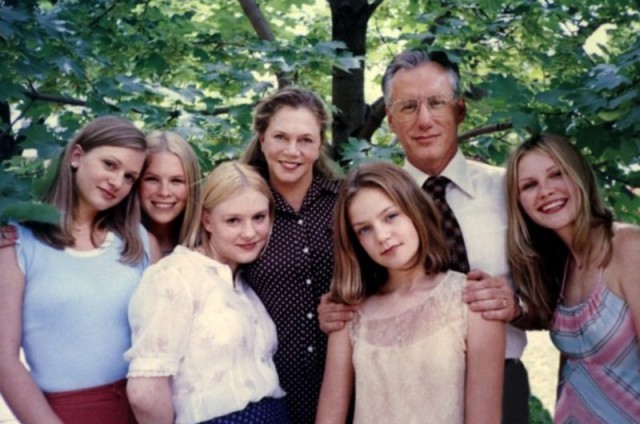
A family is torn apart by tragedy in Sofia Coppola’s The Virgin Suicides
THE VIRGIN SUICIDES (Sofia Coppola, 1999)
BAMcinématek, BAM Rose Cinemas
30 Lafayette Ave. between Ashland Pl. & St. Felix St.
Tuesday, July 17, 4:30 & 9:30
Series continues through July 19
718-636-4100
www.bam.org
The Virgin Suicides, which traces the downfall of a suburban Michigan family in the 1970s, is chock-full of period songs, with well-known tunes by Heart, the Hollies, Carole King, Styx, Todd Rundgren, 10CC, the Bee Gees, and ELO all over the film. But it’s Air’s score that gives it added emotional depth, from tender piano lines that evoke Pink Floyd and late-era Beatles to rowdier, synth-and-drum-heavy moments to mournful dirges and hypnotic, spacey sojourns. In the film, nerdy math teacher Ronald Lisbon (James Woods) and his wife (Kathleen Turner) are raising five teenage girls, Therese (Leslie Hayman), Mary (A. J. Cook), Bonnie (Chelse Swain), Lux (Kirsten Dunst), and Cecilia (Hanna R. Hall). As the tale begins, Cecilia is rushed to the hospital after attempting suicide. “What are you doing here, honey? You’re not even old enough to know how bad life gets,” her doctor says, to which she responds, looking directly into the camera, “Obviously, Doctor, you’ve never been a thirteen-year-old girl.” On her next try, Cecilia succeeds in killing herself, leading Mrs. Lisbon to become stiflingly overprotective and domineering. But she starts losing control of her daughters when high school hunk Trip Fontaine (Josh Hartnett) falls hard for Lux. Coppola (Lost in Translation, The Bling Ring) shows a sure hand in her directorial debut, marvelously capturing small-town teen angst, even if things go a bit haywire in the latter stages. The film is narrated by Giovanni Ribisi and also stars Jonathan Tucker, Noah Shebib, Anthony DeSimone, Lee Kagan, and Robert Schwartzman as a group of boys who are rather obsessed with the sisters in different ways. There are also cameos by Scott Glenn as a priest, Danny DeVito as a psychiatrist, and Michael Paré as the adult Trip, and look for a pre-Star Wars Hayden Christensen as Jake Hill Conley. In an interview with Dazed in conjunction with the fifteen-year anniversary of The Virgin Suicides, Air’s Nicolas Godin noted, “I really hated being a teenager. It was a pretty horrible time, and although I had good friends, I am so happy to be out of that time. . . . I definitely brought that to the film score, this idea of not being loved enough.” You can show your love for The Virgin Suicides at BAMcinématek on July 17 at 4:30 & 9:30 when it screens as part of “BAMcinématek and the Racial Imaginary Institute: On Whiteness.” The series continues with Francis Ford Coppola’s The Godfather Part II on July 18 and Jordan Peele’s Oscar-winning Get Out on July 19, followed by a discussion with culture writer Rembert Browne.
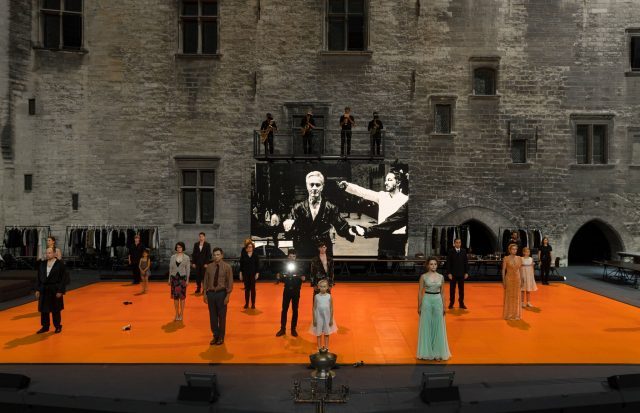

 BAMcinématek has teamed up with the
BAMcinématek has teamed up with the 

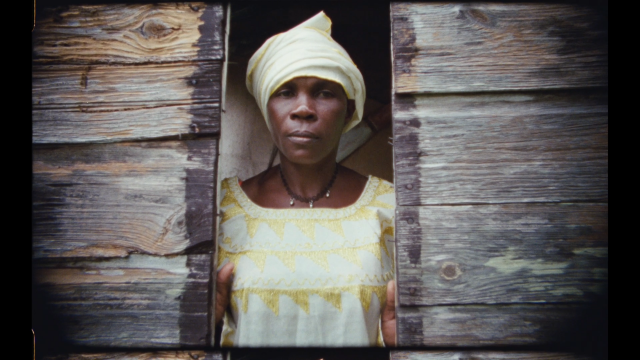

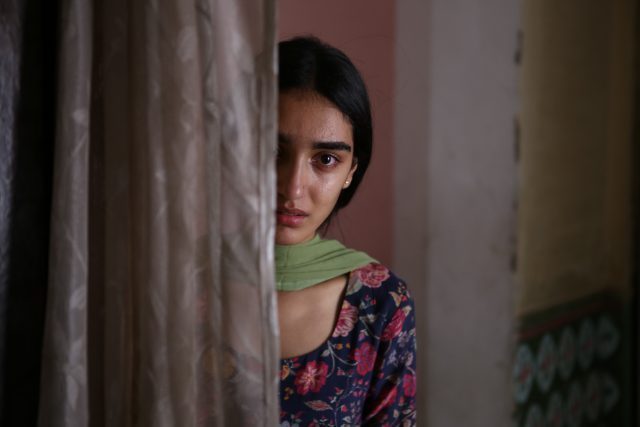
 Pakistani-Norwegian actress, writer, and director Iram Haq follows up her 2013 debut, the deeply personal I Am Yours, about a single mother’s disconnection from her parents, with another personal and heart-wrenching drama, What Will People Say. When she was fourteen, Haq was kidnapped by her parents in Norway and sent back to Pakistan to live with relatives, deprived of the freedoms she was accustomed to in Scandinavia. In What Will People Say, Maria Mozhdah, in her film debut, gives a powerful performance as Nisha, a teenager caught between her non-Pakistani friends in Norway and the old, fundamentalist ways of her parents and community. At his birthday party, her father, Mirza (Adil Hussain), seems like a good guy, but when he catches Nisha in her bedroom with Daniel (Isak Lie Harr) — they were merely talking, contemplating kissing — he assumes the worst. Believing the family has been disgraced, he takes Nisha, who was considering becoming a doctor, back to an impoverished Pakistani village to live with her aunt (Sheeba Chaddha) and uncle (Lalit Parimoo), where she will essentially be their servant. But when the police see her kissing her cousin Amir (Rohit Saraf) in the street, the family’s added humiliation leads Mirza to consider taking even more extreme action against his confused and desperate daughter.
Pakistani-Norwegian actress, writer, and director Iram Haq follows up her 2013 debut, the deeply personal I Am Yours, about a single mother’s disconnection from her parents, with another personal and heart-wrenching drama, What Will People Say. When she was fourteen, Haq was kidnapped by her parents in Norway and sent back to Pakistan to live with relatives, deprived of the freedoms she was accustomed to in Scandinavia. In What Will People Say, Maria Mozhdah, in her film debut, gives a powerful performance as Nisha, a teenager caught between her non-Pakistani friends in Norway and the old, fundamentalist ways of her parents and community. At his birthday party, her father, Mirza (Adil Hussain), seems like a good guy, but when he catches Nisha in her bedroom with Daniel (Isak Lie Harr) — they were merely talking, contemplating kissing — he assumes the worst. Believing the family has been disgraced, he takes Nisha, who was considering becoming a doctor, back to an impoverished Pakistani village to live with her aunt (Sheeba Chaddha) and uncle (Lalit Parimoo), where she will essentially be their servant. But when the police see her kissing her cousin Amir (Rohit Saraf) in the street, the family’s added humiliation leads Mirza to consider taking even more extreme action against his confused and desperate daughter.